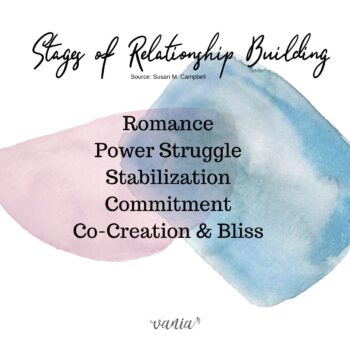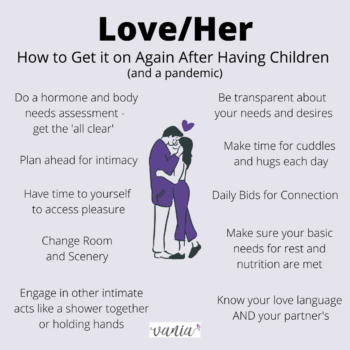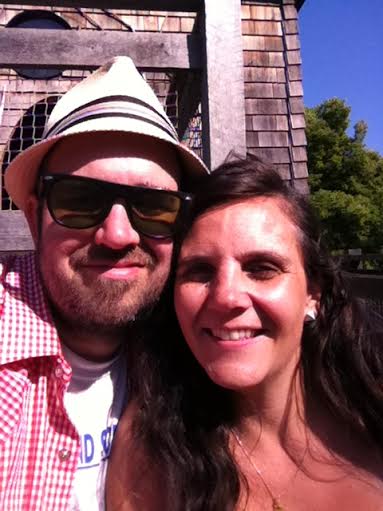Having a child is a life-altering portal for everyone, regardless of how you crossed the threshold. Since parenthood is a rite of passage, we become someone who never existed before. I used to cringe when i heard that giving birth to a baby meant that we too are newborn mothers and parents. Now i understand that a new version of me was indeed birthed when i evolved into motherhood.
This sea change also impacts the couple as they are also all-together new beings as co-parents.
Many couples have to find their way back to each other after becoming parents. This is a natural occurrence as it takes time to learn how to be in this new role as a parent. We need to sacrifice other parts of us so that we can integrate this new role into our life. The sacrifice is meant to be temporary. What makes it hard is that there is no map or guidance on how to come back to centre. We will never be who we were before as a childless couple. And yet, i think one thing that sets couples up for failure is the unrealistic expectation that they just ‘bounce back’ into their own way of being together. We assume that we just add a child to our life and it all goes back to the way it was.
Now that my own kids are older, i am starting to feel the integration of motherhood into the rest of who i am. More specifically, i am finding ways to balance my main roles, including the role of partner.
My partner and have been together for over 20 years, 15 of them as parents. These last few years have been some of our biggest growth years. We have come to know that our evolutions are mostly parallel journeys, if not always at the same place or pace. In my own relationship, we’re lucky that we are on similar aligned paths. I know this isn’t always true for many families.
It’s not lost on me that i may have an advantage as a therapist who specializes in life transitions and matrescence. I’m also a couples therapist and one of the main areas i specialize in is the transition of parenthood and how it impacts intimate relationships. I support others through areas i have lived experience in so i have been reflecting on what worked for us, i’ve come to see that we did some key things subconsciously.
I often get asked what my secret is to a lasting intimate relationship. It’s such a gift when others comment on witnessing my love with my partner. So i wanted to share some of the main takeaways that have helped me maintain and flourish in my partnership.
Human Development Stages
Growth and development isn’t just for kids. Our foot size may not be growing anymore, but that doesn’t mean we are done evolving as humans. The growth and maturation just happens in our psyche and emotional realms, or at least it should.
Becoming a parent is just one of the stages that fall into adulthood. It’s right up there with getting your first ‘real’ job, buying a home or signing a lease, finding chosen family and community, and paying taxes. Like all of these very adult tasks, becoming a parent isn’t just something that happens to our body and happens on weekends. It’s an all-encompassing sea change and is meant to turn us upside down.
We need to learn how to become something new. It’s not enough to assume a role, as that will not be enough to full integrate this rite of passage. When one of us takes on the task to learn more about becoming a parent, it serves both parents to benefit from this. And yet what happens more often is that the other parent falls into a default way of parenting as they were parented. This can lead to defensive when advice or information is shared. Knowing some of the key issues new parents face in their relationship is a great first step.
One of the most significant learnings i have benefited from in my own development is understanding Attachment Theory and attachment styles. We don’t have one stuck style, and we can absolutely heal an insecure one. This growth fits in well when we are setting intentions to mature into who we are not as an adult, versus getting stuck in our earlier versions and wounded former parts. Knowing how to heal your attachment style so you can have a reparative experience with your own child is a key component in embracing your developmental stage. This has been a huge healing edge for my own parenting journey.
 Relationship Building
Relationship Building
It is helpful to know what stage of a relationship you are in – not just how long you have been with your partner. Susan M. Campbell has a brilliant theory that highlights stages of building a deeper connection with your partner. These 5 stages of relationship building move any relationship through a process. While she first created it for intimate couples, i think this works for any relationship.
Romance is the first stage. It is when we are so excited by this new match, there are feelings of infatuation and limerance fostered by oxytocin. This is the honeymoon stage, and can last up to 6 to 9 months. After a few months of getting to know each other, Power Struggles start to show up. This marks the time of uncertainty. For many couples, this is the dance they start to cycle though. If the relationship is strong enough, the couple can progress to a stage of Stabilization.
A lot of relationships cycle through these first 3 stages. When a baby comes along, this is a great opportunity for the parents to make a Commitment to learn more skills about communication, conflict resolution, division of labour, and time to get rest. This next stage of relationship building is crucial to get to the ultimate stage of Co-Creation and Bliss. It is necessary to intentionally commit to the relationship again as a couple, and not just a level of understanding as co-parents.
If you want to know more about this theory of relationship building, i love how Jessica shared some insight about attachment styles as they impact the stages on her podcast HERE. Also this article does a wonderful job in reframing some of the stages – Initiation, Experimentation, Intensify, Integrate and Bond. I really appreciate this update as it lands for my own system with more ease.
Village Members
One thing that can help us feel more solid in our footing is to know that we are not alone in this newness. We may feel like a fawn just newly standing and being expected to run into this new life full steam ahead. And yet, while we have never done this before, many have.
This is where village comes in, and why it is so important in fact. I also know that finding this said village is so much harder than it should be, and even used to be. As social creatures, it is so helpful that we can have space to talk about what is coming up for you. I love being happily surprised when my situation is reflected in others i chat with. That could be connecting with a new friend in yoga class about motherhood, or another student about menstrual cycles, or maybe your cousin at the next family gathering. Being vulnerable is a wonderful alchemizing quality that lessens our assumed aloneness or shame.
Of course, having this community is not always possible: When you don’t have elders in your life, or the people you know that are parents are not your role models, it helps that we have other ways to create a village.
As a book lover, i always fall back on books as my main resource. There is something so comforting about knowing that a book was researched, written, approved and published tells me that i’m so not alone in this stage of life. Now, we also have social media (for better or worse, it’s like it’s own marriage). I also love podcasts and of course, a good blog!
Some of my favourite books on this specific topic are:
*Baby Bomb: A Relationship Survival Guide for New Parents by Kara Hoppe and Stan Tatkin
*To Have and to Hold: Motherhood, Marriage and the Modern Dilemma by Molly Millwood
*The Gottmans and their plethora of books and more here
House Meetings
I know this seems too much like a work meeting, but i promise having a meeting with your beloved about the business side of life can really uncouple all the work from the intimacy. If we are partnered or in a committed relationship when we become a new parent, it is important to have regular conversations with your partner. Talk about things like what is coming up for the week with social engagements and meetings or appointments. Share things you have learned about parenting, or ways to alleviate the mental load. Share resources, have a book club with 2 members!
Take time to create your shared values and needs list. As a place to start, this article shares some key ones. Many people in relationships are surprised to find that what they think is a shared core value is in fact not a shared priority with their beloved. It is the shared values and needs that keep us aligned on a paths in life. They can manifest in things like how housework is done, or when to book a date night. These are the ways to put needs and values into action.
Keep Things Intimate
I don’t mean to jump right back into bed after having a bed. At least, not unless it’s to have a real nap! But I do know that we still need to feel intimacy with our partners. A lot of us are touched out after having a child, especially in the case of the primary caregiver. And yet intimacy doesn’t always have to be more physical touch, but can be beautiful gestures and offerings that foster co-regulation and connection.
This helps us stay in each other’s orbit just enough so that when it does feel that time is aligned, it’s not as hard to jump past these blocks that were put up. And then we can come back to a more regular date night and routine.
In a recent blog article on Momwell, they talk about how different sex drives can impact a couple. This is even more intensified when a baby comes along AND the mental load is not balanced. I really appreciate how they name consent, timing, focus, and pleasure as key tenets of fostering a shift in our responsive sex drive.
It’s also important for the non-primary parent to remember the struggle for the one at home with a new baby is a struggle of duality – the dance of becoming a sexual woman and also a mother. These two archetypes or roles have been quite polarized. I talk more about this in a previous journal article – you can read it here.
I personally really love focusing on what seems like little things – rituals and routines, intentional dates that honour mutual delight, and connection bids that enhance attunement. These are the daily practices that have helped my partner and i through the darkest times as new parents. When we didn’t have energy, time, or resources for any significant date nights, we always had access to cuddles, appreciation and dinners by candlelight.
I want to end with a gentle reminder that all relationships take work and communication, as well as a focus on our Self. Even the great Esther Perel, a renowned couples and relationship therapist, has shared she wanted to leave her husband at times: “It isn’t so much that we leave the person we are with as we want to leave the person we have become.”






 As the fog of new parenthood begins to lift, we are faced with the new reality of everyday life as parents. It may take longer than we expected (or want to admit) to get a good night’s sleep or a long bubble bath—let alone have a date night… without our babe in tow.
As the fog of new parenthood begins to lift, we are faced with the new reality of everyday life as parents. It may take longer than we expected (or want to admit) to get a good night’s sleep or a long bubble bath—let alone have a date night… without our babe in tow.